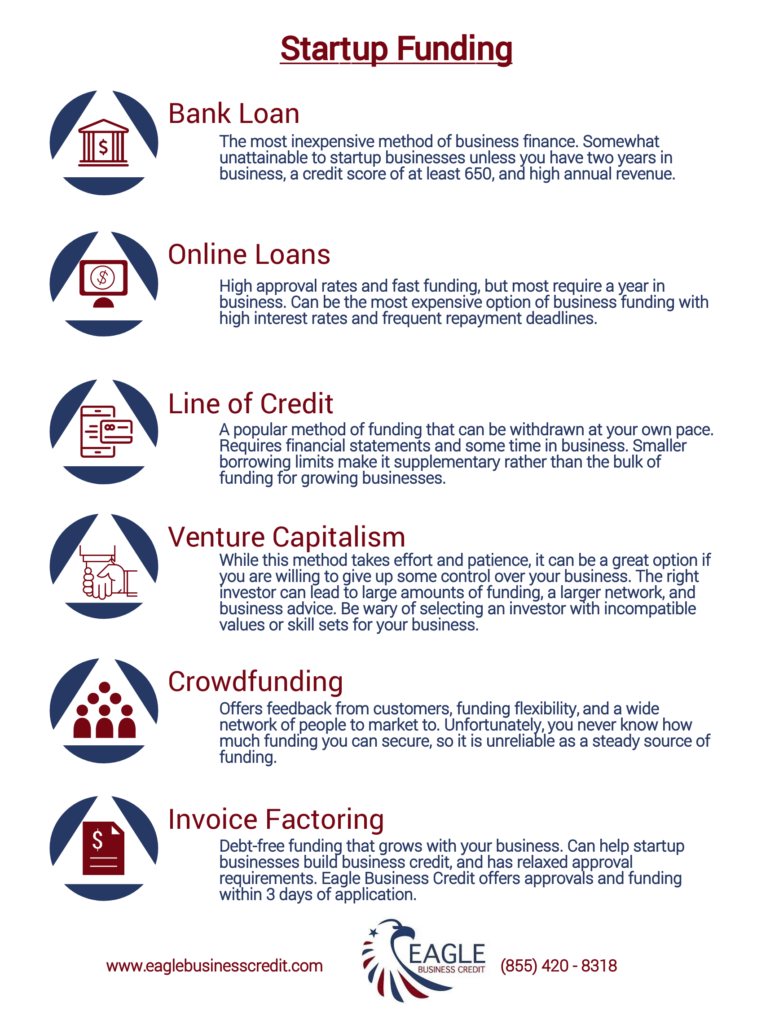Diversify Your Startup Financing with These 6 Funding Options
By: Ian Varley

Startup businesses are tricky. Some advice is to never stop searching for capital to grow your business. Some advice is to only secure the funding necessary to get a product out, then start another round of fund raising. There is no one right answer, and the options presented to entrepreneurs for business funding can be overwhelming. Of course, not every business will meet the necessary requirements for strong financial backing. Here is a breakdown of the options for entrepreneurs in funding their startup businesses.
- Bank Loan
- Online Loan
- Line of Credit
- Invoice Factoring
- Venture Capitalism
- Crowdfunding
Bank Loan
Banks offer the best loan terms and funding amounts to businesses, but typically these loans are unattainable for startup businesses. Without a credit score of at least 650, around two years in business, personal collateral, and high annual revenue there is slim chance of approval.
Online Loans
Online lenders offer high approval rates and access to fast funding. Even still, your business will need to have some time in business under its belt. When banks and larger lending institutions slowed their lending to small businesses after the Great Recession, online and alternative lenders gained popularity. Compared to bank loans, online loans are more expensive with shorter terms and smaller amounts offered. Even with higher interest rates and more repayment deadlines, the speed and ease of funding access draws many entrepreneurs to these lenders.
Line of Credit
Approximately 47% of businesses have an open line of credit. This popular funding method offers a finite amount of funding that you can withdraw at your own pace. Interest rates are based on the prime rate and only apply to the funds you withdraw. It is typically challenging for startup businesses to seek approval without enough financial statements or time in business. The benefits of flexible funding and strengthened cash flow can be outweighed by the smaller borrowing limits, strict approval requirements, and personal financial risk of repayment in case your business fails.
Invoice Factoring
Invoice Factoring falls under the alternative lending umbrella and is a smart funding choice for startup businesses. Factoring is a debt-free method of financing that does not require a long history in business, a high credit score, or a long time for approval. This financing method offers flexible funding that grows with your business as it is based on the volume of your sales. Accounts receivable funding involves a factoring company advancing payment to your business for your open invoices. Typical factoring fees for are between 1% and 4% of the total invoice cost. This working capital funding strategy allows your business to grow, build your business credit, and focus on the core of your operations rather than the heart of your cash flow.
Venture Capitalism/Equity-Based Funding
Venture capitalists offer large amounts of financing, networking, and strategy to startup entrepreneurs. The right venture capitalist partner can lead to business success, but a mismatched focus, skillset, or culture between yourself and the investor could be straining and ruin your entrepreneurial spirit. Rather than interest rates and repayments on debt-based finances, venture capitalism involves an exchange of control over the business. With the right time, patience, and selective approach, venture capitalism can be a solid source of funding for a startup entrepreneur.
Crowdfunding
Crowdfunding is somewhere between bootstrapping and equity-based financing. Your investors are friends, family, and early-stage customers. Your business pitch invites fundraising in exchange for some equity or product that your business will offer. Crowdfunding offers business owners feedback from customers, funding flexibility, and a wide network of people to market to. Unfortunately, you never know how much funding you will be able to secure from crowdfunding, so it’s smart to find other sources of financing as well.













